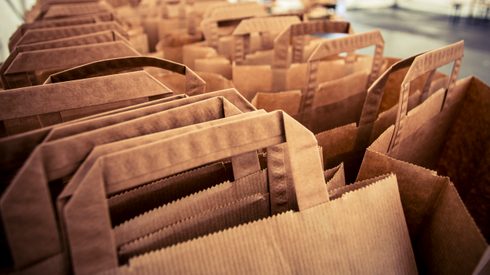Russian containerboard prices were “falling like snow in winter” in December 2022, according to market sources. Lower-than-expected demand and a surplus of available containerboard caused by the new package of EU sanctions introduced in October resulted in significant price decreases, contacts reported.
Recycled containerboard (RCCM) prices went down by an average of Rouble 12,000/tonne, sliding below Rouble 30,000/tonne, while unbleached kraftliner prices decreased by some Rouble 10,000/tonne and reached the level of approximately Rouble 40,000/tonne. White-top kraftliner prices remained stable at about Rouble 75,000/tonne, though this segment, too, was hit by lower demand, as some packaging producers considered switching to cheaper boxes.
Meanwhile, paper for recycling (PfR) seemed to reach a bottom when it hit some Rouble 6,500/tonne in mid-December but then rebounded somewhat, rising to as much as Rouble 10,000/tonne at the end of the month.
The latest round of EU sanctions, which effectively banned exports and trading of virgin containerboard, created a surplus, forcing manufacturers to lower prices. The situation put additional pressure on RCCM producers as well, contacts said. Containerboard trading volumes worsened from November to December, and the traditional pre-holiday demand did not materialize.
Consumer activity was quite slow in the run-up to the end of the year, and packaging producers had already bought enough containerboard during the fall months, limiting their winter purchases. Lower e-commerce sales, the exit of large foreign employers from the country and a significant swath of the population holding post-Covid-19 consumer loans also contributed to a negative impact on the consumer market and demand for containerboard.
Virgin containerboard surplus
Prices for unbleached kraftliner in Russian roubles fell by some 37% over the course of 2022, and by more than 19% alone month on month in December. Exports were decreasing from the end of summer, and with the introduction of the latest EU sanctions in October, more and more board remained in the country, driving prices down, sellers said.
Under the latest sanctions, as of January 8, no new business can be conducted with EU parties, and existing business had to be completed by that date. New emerging export markets such as Africa are being explored, but the logistics situation remains difficult, according to market contacts.
White-top krafliner prices remained stable in December, but containerboard producers may choose to focus on new products, as some of their customers might change to brown boxes, sources noted. It is not difficult to diversify production and switch to manufacturing of, for example, sack kraft paper, contacts said.
Recycled containerboard prices fall
RCCM price levels tumbled by some 47% in rouble terms over the course of 2022 and by over 28% month on month in December.
The last month of the year started with individual discounts of Rouble 2,000/tonne, leading to further decreases in the range of Rouble 8,700-12,000/tonne.
“The price depended on what individual deal you could agree on. Once producers saw that the volumes were low, they started negotiating with customers on a case-by-case basis,” a contact in the packaging sector said. The demand for corrugated packaging is also not exactly at a high level now, he added.
PfR prices continued their downward cycle in December, touching Rouble 6,500/tonne, a level where collection is no longer profitable, before bouncing back up to Rouble 10,000/tonne at the end of the month. However, only 10% of Russian PfR is collected “from the ground,” and the rest is sold by supermarkets, a market source pointed out.
With the lower demand for this raw material, the large supermarket chains have enough to sell, unless they decide to hold on to their PfR to drive prices up, as they have done before, he commented.
Future expectations
Traditionally, producers of corrugated packaging take downtime at the beginning of January, during the week-long Russian public holiday period, and trading volumes are normally some 15% lower in January than in December.
While January price decreases are generally expected for all grades of containerboard, RCCM levels remained stable at the beginning of the month, while all of the virgin grades were down by at least Rouble 6,000/tonne, according to contacts. In certain cases, unbleached kraftliner was down by Rouble 10,000/tonne, some market sources said.
Though it is too early to say how the month will end, it is generally expected that even though the pace of RCCM price decreases is slowing compared to December, drops of at least 5% are likely. RCCM producers cannot afford to lower prices much further, unless PfR prices drop, a packaging contact suggested.
Market players envision a difficult Q1, as export logistics will remain expensive and complicated, and the output of Russian producers remains high, adding to the surplus. Nevertheless, they remain more optimistic about Q2, due to an expected increase in local demand as well as improved opportunities for exports and, possibly, a somewhat weaker rouble.







